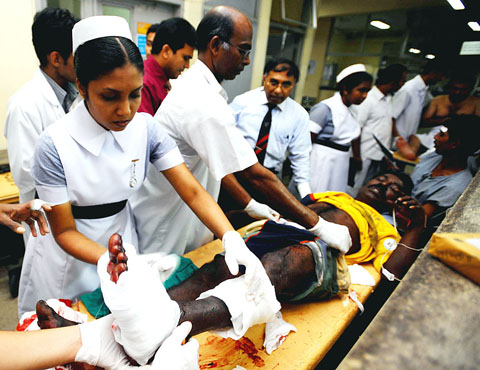A blast blamed on separatist Tamil Tigers wounded 45 people in Sri Lanka’s capital yesterday, while renewed fighting in the embattled north killed 18 rebels and three soldiers, the military said.
Military spokesman Brigadier Udaya Nanayakkara accused the Tamil rebels of setting off the blast on a busy street in the heart of Colombo.
“They are desperate because of defeats along the northern front lines and are targeting civilians,” Nanayakkara said.

PHOTO: AFP
The small bomb exploded in a commercial area shortly after noon, tearing through a crowd of weekend shoppers.
“There was big sound and people screamed and ran in all directions. I saw several people covered with blood lying on the ground,” said Shantha Ratnayake, who was passing the area when blast occurred.
Fighting in Sri Lanka’s civil war has escalated in recent months, with the military capturing a series of rebel bases and large chunks of territory. Officials have reiterated a pledge to crush the guerrillas by the end of the year.
Hospital spokesman Anil Jasinghe said 45 people were receiving treatment for injuries received in yesterday’s blast.
“Most of them have suffered minor injuries,” he said, adding that no deaths were reported.
Rebel spokesman Rasiah Ilanthirayan did not answer calls for comment, but the Tamil Tigers routinely deny responsibility for such attacks.
The rebels, blamed for scores of suicide bombings and other attacks on civilians, are listed as a terrorist group by the US, the EU and India.
Meanwhile, fighting continued on Friday along the front lines that separate government-held territory and the rebels’ de facto state in the north, the Defense Ministry said.
In the worst battle, soldiers killed eight rebels in two separate clashes in Kilinochchi District.
Two soldiers were also killed, it said.
Other fighting in Vavuniya, Welioya and Jaffna killed 10 guerrillas and one soldier, while eight soldiers were wounded, the statement said.
Both sides routinely exaggerate enemy casualties and underreport their own. Independent verification of the fighting is not possible because most journalists are barred from the war zone.
Amid escalating violence, the government is urging civilians living in rebel-held areas to flee to government-controlled territory, saying it would ensure their safety. Government helicopters dropped leaflets on Thursday in rebel-held areas urging villagers to leave.

In the sweltering streets of Jakarta, buskers carry towering, hollow puppets and pass around a bucket for donations. Now, they fear becoming outlaws. City authorities said they would crack down on use of the sacred ondel-ondel puppets, which can stand as tall as a truck, and they are drafting legislation to remove what they view as a street nuisance. Performances featuring the puppets — originally used by Jakarta’s Betawi people to ward off evil spirits — would be allowed only at set events. The ban could leave many ondel-ondel buskers in Jakarta jobless. “I am confused and anxious. I fear getting raided or even

Kemal Ozdemir looked up at the bare peaks of Mount Cilo in Turkey’s Kurdish majority southeast. “There were glaciers 10 years ago,” he recalled under a cloudless sky. A mountain guide for 15 years, Ozdemir then turned toward the torrent carrying dozens of blocks of ice below a slope covered with grass and rocks — a sign of glacier loss being exacerbated by global warming. “You can see that there are quite a few pieces of glacier in the water right now ... the reason why the waterfalls flow lushly actually shows us how fast the ice is melting,” he said.

Eleven people, including a former minister, were arrested in Serbia on Friday over a train station disaster in which 16 people died. The concrete canopy of the newly renovated station in the northern city of Novi Sad collapsed on Nov. 1, 2024 in a disaster widely blamed on corruption and poor oversight. It sparked a wave of student-led protests and led to the resignation of then-Serbian prime minister Milos Vucevic and the fall of his government. The public prosecutor’s office in Novi Sad opened an investigation into the accident and deaths. In February, the public prosecutor’s office for organized crime opened another probe into

RISING RACISM: A Japanese group called on China to assure safety in the country, while the Chinese embassy in Tokyo urged action against a ‘surge in xenophobia’ A Japanese woman living in China was attacked and injured by a man in a subway station in Suzhou, China, Japanese media said, hours after two Chinese men were seriously injured in violence in Tokyo. The attacks on Thursday raised concern about xenophobic sentiment in China and Japan that have been blamed for assaults in both countries. It was the third attack involving Japanese living in China since last year. In the two previous cases in China, Chinese authorities have insisted they were isolated incidents. Japanese broadcaster NHK did not identify the woman injured in Suzhou by name, but, citing the Japanese